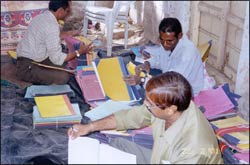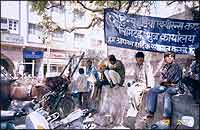| March 5, 2001 |

|
HOME | NEWS | SPECIALS | |||||||||
|

|
The Rediff Special/Archana Masih Banking in the Spoils
Part II: Rebuilding from the Rubble Part III: Warriors for Peace Part V: Images of Bhuj The earthquake scarcely left any building in Bhuj untouched. Schools, hospitals, offices, banks -- the quake ripped through their structures, either reducing them to a heap of rubble or inflicting severe damages. The Union Bank of India was one of them. Its staff was lucky to have survived because of the Republic Day holiday. They could retrieve floppies, hard discs and other important documents within a few days, but the real problem began subsequently. "Our main problem was searching for new premises," says branch manager Arvind Kothari. It took them over a fortnight to find an alternate location -- though only on an 11 month lease. The phones have yet to be transferred and the landlord's phone in the adjacent shop remains their sole link.
"We are doing routine business of withdrawal and deposit. The loan package is being prepared and the repayment of installments will be worked out suitably," says Kothari. Since banks have been able to recover their documents, they maintain their business has not been hit. Customers who have lost their pass books are issued duplicate ones. Since all accounts opened in the last 4, 5 years made it mandatory to affix a photograph, most account holders can be identified through their names and after verifying their signatures.
The branch manager says the bank -- with 9,000 account holders and a Rs 35 crore (Rs 350 million) business -- did not witness any panic withdrawals after it resumed functioning on February 8. In fact, contrary to the initial fear of a slump in business, deposits have picked up since the quake. Inquiries are being made for housing loans to rebuild damaged houses. Bank officials maintain the modalities for these loans will be in place within two weeks. Apart from that, there have been many calls for new lockers. "People would rather keep their valuables safe with us," adds Malviya. The Syndicate Bank -- which has three locker units -- saw all its 75 lockers in the basement disappear in the debris. In the basement were also the cash cabinet and loan documents. The building where it was situated was destroyed; the orthopaedic hospital on the second floor lost three patients when the building collapsed. "Ours was a fully computerised branch, we thought we would not be able to retrieve the vault," adds the manager. While the bank vaults and cash lay buried, the district administration announced that the site would be bulldozed completely. "In fact, the bulldozer had already arrived when we were asked to get in touch with the army," continues bank staffer Ashwin Khare. Once the army was brought on the scene, the 12 Engineers regiment pulled out the vault after a four-day effort. Since then it has functioned from a temporary location and all its 21 staff have reported for work. The bank grants up to Rs 80,000 to the closest relative of a deceased account holder on the presentation of a death certificate. For an amount higher than that, a succession certificate is required. Till January 26, 27-year-old Narendra Zaveri had an account with the Union Bank of India. The quake brought his building down and took him with it. Now his father is at the bank with his other son to get Narendra's money transferred to his brother's account. The bank manager assures him it will be done -- they had submitted the death certificate needed for the account that Narendra held. "The manager has been helpful. This is our second trip, he says it is almost done," says Narendra's father, a cloth shop owner. For deceased single account holders, the manager explains, an affidavit or an indemnity bond is necessary for the transfer or withdrawal of money. Co-operative banks also maintain there have been no mass withdrawals. "Everybody has been affected, hence banks have also been affected. But to my knowledge, establishing a customer's identity has not been a problem for any of the banks," says M P Vohra, manager of the Bhuj Commercial Co-operative Bank.
The company -- which Patel says controls 90 per cent of the market share and receives premium amounting to Rs 5 crore 50 lakhs (Rs 55 million) per annum -- has registered over 1,024 insurance claims so far. These include shops, vehicles, houses and death. Patel says that within a month of the quake the company had settled three death and 13 vehicle claims. It is just then that 25-year-old Neetaben Gajjar entered the tent. Today is her turn to receive the cheque for her husband's death. She also lost her five-year-old daughter in the quake. With tears in her eyes, she received the Rs 500,000 cheque from Patel as photographers took pictures for the company's records. Her brother-in-law says getting their claim was not much of a problem as they had the documents and knew people who could speed up things. As she held the cheque with her moist fingers, Neetaben said she had no clue about the future. She had not even thought about what she would do with the cheque. An enthusiastic manager adds that for houses that have incurred total loss, the company would pay whatever the sum insured on the submission of a demolition certificate. It had received 50 total loss claims so far. For partially damaged houses, surveyers would be sent to assess the damage. A certificate from the zilla panchayat or the collector's office would be required. In the absence of policy documents, a confirmation from the revenue office would have to be obtained. "We are asking for minimum requirements for the settlement of claims," adds Patel who hopes he and 18 of his staff will move to new premises in a few days. As for the people of Bhuj -- most of whom did not have insured properties -- the quake has served as a cruel reminder. Several middle families have been making trips to insurance companies to insure their properties now. "Except the parapet of my house and the Maruti 800, nothing else was damaged. But now I want to insure my property," says a Bhuj doctor who has sent his family away to Baroda. For the less fortunate, the reminder has come too late. Design, Photographs: Dominic Xavier The Earthquake: The Complete Coverage Tell us what you think of this special report |
HOME | NEWS | CRICKET | MONEY | SPORTS | MOVIES | CHAT | BROADBAND | TRAVEL
ASTROLOGY | NEWSLINKS | BOOK SHOP | MUSIC SHOP | GIFT SHOP | HOTEL BOOKINGS
AIR/RAIL | WEDDING | ROMANCE | WEATHER | WOMEN | E-CARDS | SEARCH
HOMEPAGES | FREE MESSENGER | FREE EMAIL | CONTESTS | FEEDBACK





